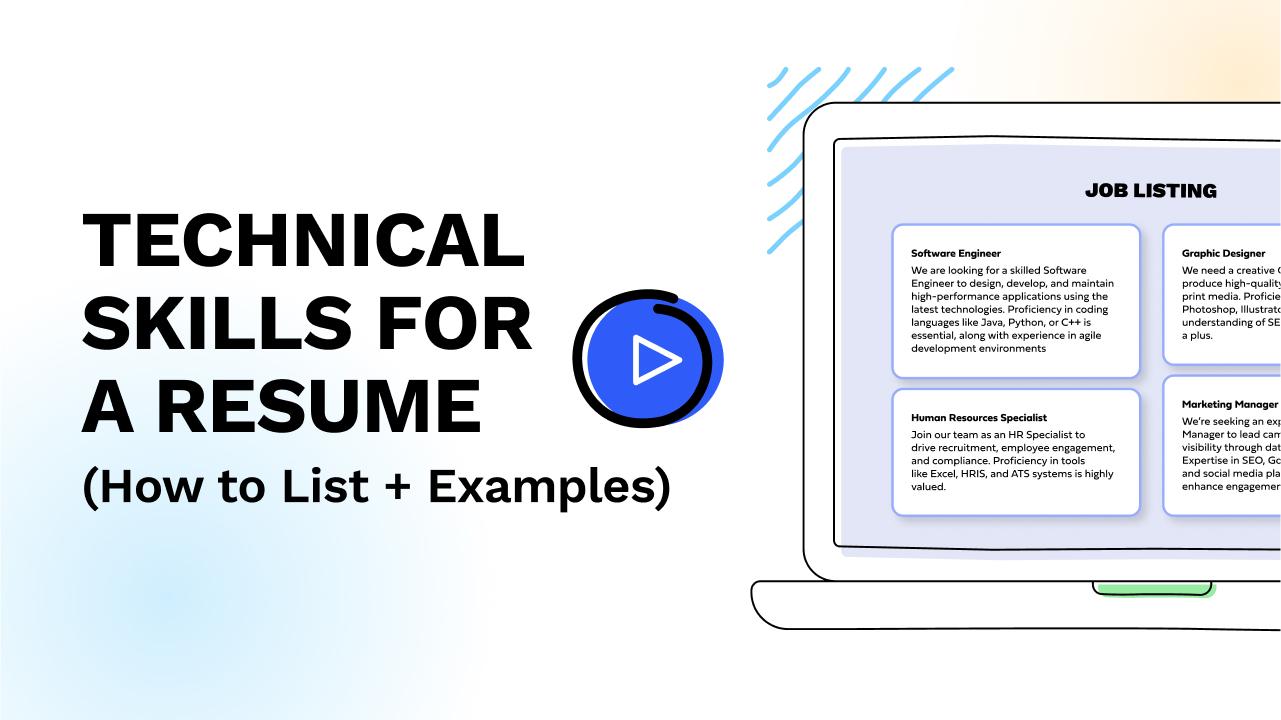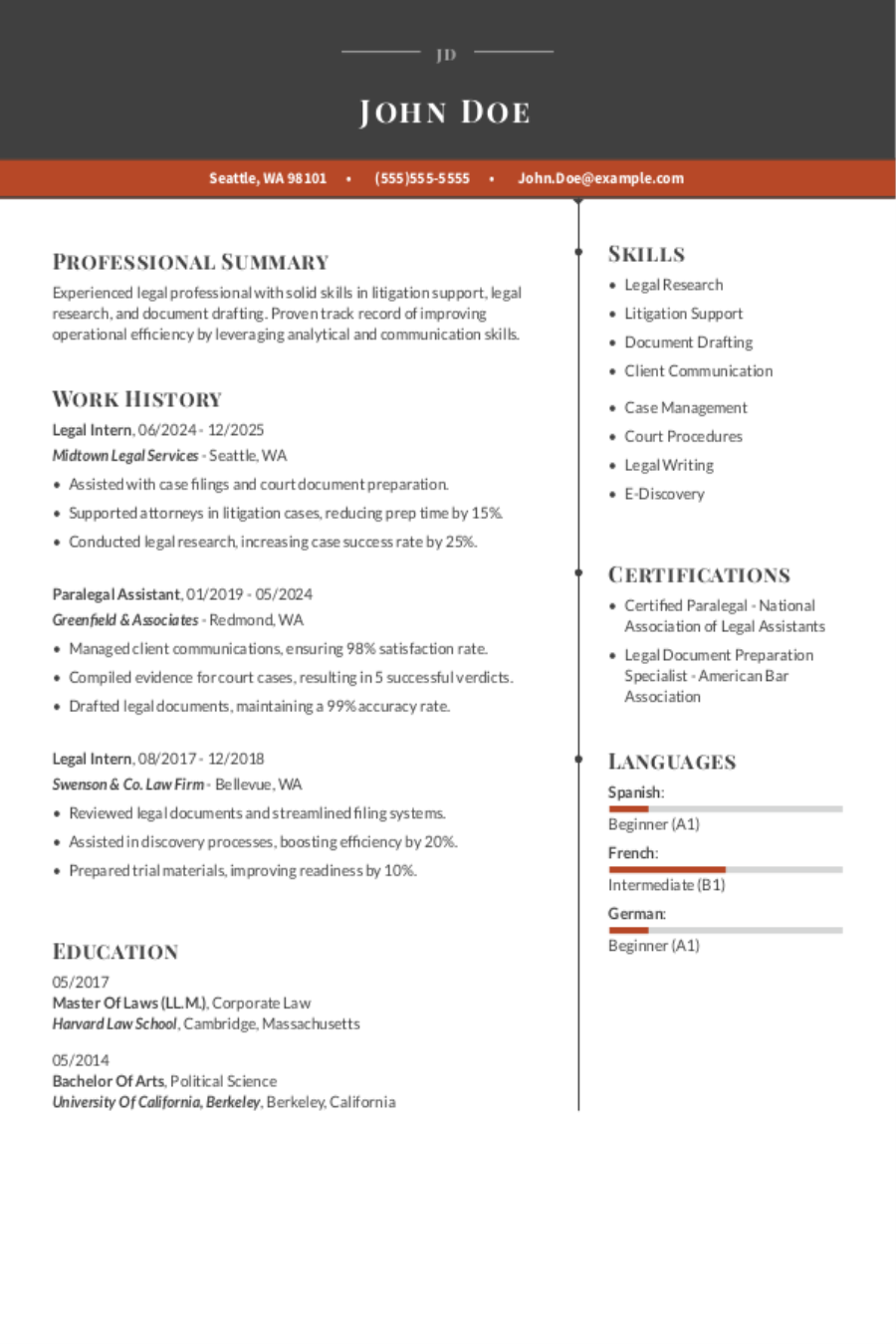Table of contents
What are Technical Skills and Why Are They Important?
Technical skills are the practical knowledge and abilities that help you complete specialized tasks. Unlike soft skills, technical skills are often more measurable and objective than their soft counterparts — and they’re just as important.
Resumes need technical skills because they help establish your expertise and prove that you’ve got what it takes to do the job. We’ll help you showcase your competency with our comprehensive guide and list of technical skills for a resume that makes an impact.
Keep reading to learn:
- 50 industry-specific technical skills for a resume.
- 4 tips for listing technical skills on your resume.
- How to highlight your level of proficiency.
- How to improve your technical skills.
Need a Resume to Highlight Your Skills? Try our Resume Builder. This tool provides recruiter-approved templates, tips from resume experts and automatically generated text designed to make your resume-building process fast and painless.

50 Technical Skills for Your Resume (+ Text Examples)
Every industry requires a different set of technical skills, which means job seekers must be extra vigilant about how to list technical skills on their resume. Choosing the specific technical skills to list on your resume requires an understanding of your industry and role.
If you hunger for more examples of technical skills after you read the list below, you should explore our resume examples, where you’ll find hundreds of job-specific skills showcased in context.
Now, lets check out the technical skills examples for your resume.
Administrative
- Microsoft Office Suite
- Email etiquette
- Data entry
- Note taking
- Basic IT skills
How to Add Technical Skills to Your Administrative Resume:
“Administrative assistant with extensive experience in Microsoft Office Suite and data entry.”
Accounting
- Generally Accepted Accounting Principles (GAAP)
- QuickBooks
- Microsoft Excel
- Tax preparation
- Knowledge of regulatory standards
How to Add Technical Skills to Your Accounting Resume:
“Detail-oriented accountant with over five years of experience using QuickBooks and tax preparation software.”
Information Technology
- Network security
- Operating systems like Windows, Linux and MacOS
- Coding languages like Java, HTML and Python
- Data analytics
- Cloud technology
How to Add Technical Skills to Your IT Resume:
“Led three learning sessions for new hires covering the basics of cloud technology.”
Finance
- Financial statements
- Enterprise resource planning (ERP) software like SAP and Oracle
- Cash flow management
- Forecasting
- Invoice processing
How to Add Technical Skills to Your Finance Resume:
“Generated weekly expense report overviews for upper management on SAP.”
Graphic Design
- Adobe Creative Suite
- Typography
- Color theory
- Logo design
- User experience (UX/UI)
How to Add Technical Skills to Your Graphic Design Resume:
“Designed an award-winning logo for the North Carolina-based medical device company Aberin.”
Education
- Lesson planning
- Presentations
- Classroom management
- Student evaluations
- WebCT (or Blackboard Learning System)
How to Add Technical Skills to Your Education Resume:
“Experienced fifth-grade teacher skilled in creating lesson plans and managing online classrooms via WebCT.”
Project Management
- Subject matter expertise
- Agile software
- Scrum management
- Project scoping
- Task management
How to Add Technical Skills to Your Project Management Resume:
“Led daily Scrum meetings with a five-person engineering team.”
Engineering
- Robotics
- System design
- Nanotechnology
- Statistics
- Programming
How to Add Technical Skills to Your Engineering Resume:
“Seasoned engineer with a background in nanotechnology and robotics.”
Healthcare
- First aid/CPR
- HIPAA compliance
- Medical billing and coding
- Patient data analysis
- Vital signs
How to Add Technical Skills to Your Healthcare Resume:
“Created 500+ medical billing reports, following up with patients to discuss payment options.”
Marketing
- Search engine optimization and search engine marketing (SEO and SEM)
- Content management system (CMS)
- Email marketing and automation
- Data visualization
- Social media platforms like Facebook, Twitter and TikTok
How to Add Technical Skills to Your Marketing Resume:
“Implemented comprehensive SEO strategy, leading to a 30% increase in clicks.”
4 Tips for Listing Technical Skills on Your Resume
1. Read the Job Listing Closely to Identify Relevant Skills to Add to Your Resume
You know you need to highlight your technical skills, but which ones? We suggest starting with the job ad.
A good job listing will always include a job description and requirements. Comb each line carefully, highlighting or underlining every skill you encounter. As you start writing your resume, you’ll return to this keyword list again and again for ideas on how to properly phrase and present your skill set.
Building your skills section around keywords from the job listing is a smart move because it demonstrates how well your qualifications align with the role. Even better, a resume that’s custom-made to match the job listing is better-positioned to pass through the applicant tracking systems (ATS) that many employers use to screen candidates.
2. Include Key Skills in Your Work Experience Section
Once you have a list of keywords, you need to add them to your resume. The best place to start is the work history section.
Most resume formats showcase work experience, starting with the most recent position and working backward. Each position should include bullet points to highlight notable achievements — see our resume-formatting guide for a concrete example. Keep your skills list handy as you detail your work history, inserting keywords where appropriate.
Don’t forget to show the result of your skills by including quantifiable achievements. For example, instead of saying you served customers, say something like, “Served 50+ customers daily with a 95% satisfaction rate in follow-up surveys.” Specific numbers like these will help employers visualize your impact on previous roles.
3. Insert Skills Throughout Your Resume
Work experience isn’t the only place where your skills can shine. Review the rest of your resume for keyword opportunities.
The most obvious place to promote your skills is the skills section. Whether you’re using a chronological resume that’s focused on professional experience, or a combination or functional resume that emphasizes skills, you will have ample opportunity to promote your talents.
The next sections to address are: resume objectives and professional summaries. These sections include two to four sentences summarizing your career and goals to convince an employer you’re the best fit for the job. Since this section is so prominent — often at the beginning of the resume, serving as an introduction to the candidate — you should hone in on your top skills and achievements rather than stuffing it with a long list of secondary skills.
4. Use Action Words and Strong Verbs
Companies like to hire engaging, motivated workers, and you can show them your drive by including strong action words in your resume.
What are action words? These are verbs that describe physical or mental actions. They can take your personal skills to the next level by showcasing how active you are in applying them.
Here are a handful of the verbs that frequently appear in resumes:
- Planned
- Executed
- Implemented
- Oversaw
- Drove
- Designed
- Proposed
- Launched
- Managed
- Trained
- Acquired
Including these in your professional summary and work experience section will make your resume stronger and allow you to highlight plenty of specific professional skills throughout your resume.
How to Articulate Your Level of Proficiency With Technical Skills
Technical skills fall on a spectrum from basic to advanced. To make the most of your skill set, you will need to convey to the hiring manager how skilled you are at each one. Some resume templates even include visuals to emphasize skill proficiencies.
Here are the four skill levels to consider and what each one means.
Beginner
You have a baseline understanding of the technical skill or tool, but have very little practical experience using it. Beginners need some practice until they can move on to the next level.
Intermediate
You possess the skills needed to finish tasks competently. At this stage, you are usually capable of employing the skill independently but may, on occasion, require some support to finish more challenging or complex assignments.
Advanced
You know the skill as well as anyone and require very little or no support, even using it to finish complicated tasks. Your colleagues see you as a strong, reliable resource whenever they’re working on assignments that involve the skill.
Expert
You are seen as a leading practitioner of this technical skill inside and outside your organization. People in the industry, including fellow experts, may consult you on complicated problems related to the skill. You’re considered a genuine expert.
How to Improve Your Technical Skills
If you want to be more than a beginner, technical skills require practice and persistence. Outside of the workplace, it can seem challenging to get the experience you need. The good news is there are more ways than ever to develop these skill sets if you put your mind to it.
Take Free Online Courses
Sign up for a free course on the technical skill of your choice on Udemy, Coursera or edX, where you can find free classes from expert sources, such as the esteemed Harvard University. When you finish a course, make sure to add it to your LinkedIn profile so recruiters know you’ve acquired the skill set.
Consider Enrolling in an In-person Class
If you’re the type of person who needs face-to-face instruction, then an in-person class may be the right answer for you.
Enter the technical skill of your choice in your favorite search engine and add the nearest city or town to guarantee you’re narrowing it down to local classes. This approach may not work for all skills in every part of the country, but its worth a try, especially for skill-building that requires a lot of communication, like learning a foreign language.
Watch Online Tutorial Videos
YouTube has become an invaluable learning resource for millions who search the platform every day seeking tutorials on everything from tying a necktie to fixing computer code. Any technical skill you can think of, you’ll find a video addressing exactly that.
But don’t limit yourself to YouTube. TikTok is another platform that’s rapidly becoming a go-to archive of tips and tricks to bolster any skill set.
Put Your Technical Skills Into Practice
Ultimately, classes are great, but a skill wont be truly advanced until you have the opportunity to put it in practice. If its feasible, tell your current manager about the skills you’re trying to develop and ask for an opportunity to apply them. When that’s not possible, seek projects outside of work, like building a portfolio site or creating a useful tool with JavaScript. Keeping an eager, open mind will give you more chances to build your skills.
FAQ
The best way to improve your technical skills is with on-the-job training and experience. Nothing beats applying your skills every day in a workplace.
When you aren't in a workplace where skill-building is valued, you may have to turn to alternatives. As we covered above, you could take online courses, enroll in in-person classes, kickstart a relevant project or watch tutorial videos online.
Yes, Microsoft Office counts as a technical skill as well as a computer skill. Putting Office on your resume would imply you are skilled in Word, Excel, PowerPoint, Access, Publisher, Outlook and Teams. If you only know some of these, it would be best to list the individual software programs on your resume.
No matter how far along you are in your career, you'll still benefit from skills that set you up for success in five, 10 and 15 years down the road. These are often referred to as 21st century skills. Here are four examples of technical skills that would help future-proof your career:
- Programming Languages. Learning a programming language, particularly a popular one like JavaScript or Python, opens up a world of possibilities for job seekers. So many diverse industries utilize these languages that you'll be spoiled for options.
- Data Analysis. Mountains upon mountains of valuable data are generated each day. Companies will need creative, skilled people to help them gather, interpret and present data findings.
- Cloud Computing. With so much data out there, and so much of it stored in cloud storage, cloud computing is one of the most valuable data handling skills that you can develop.
- Artificial Intelligence (AI). As AI becomes omnipresent in our daily lives, companies will seek people with the technical skills to create and maintain neural networks and signal processing.
Was this information about Technical Skills For A Resume (How To List + Examples) helpful? Let us know!
Don is a Certified Professional Resume Writer (CPRW) with more than 10 years’ experience creating digital content, including four years helping job seekers develop their careers. He holds an M.S. in Journalism from Northwestern University.
More resources

15 Latest Resume Trends for 2026 + Examples
Learn how these 15 current resume trends for 2026 can help you...

AI-Resistant Careers Index 2026: 20 Jobs That AI Can’t Replace
Resume Now s latest report breaks down the most AI-proof caree...

60% of U.S. Workers Expect AI to Eliminate More Jobs Than It Creates in 2026
Resume Now s newest report shows growing concerns about the im...

Traditional Legal Internship Resume Example Guide
As a legal intern your resume should highlight essential skil...

Music Resume: Examples, Templates & Tips
As a music professional you need a resume that showcases your...

Psychology Resume: Examples, Templates and Tips
As a psychology professional you need a resume that highlight...
